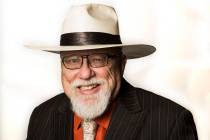Medical providers should take heed
It may seem strange: Medical practitioners could learn a lot from Col. Rodolfo Meana, who was no stranger to violence.
Yes, from him they could learn to really care about people.
In Las Vegas, Meana undoubtedly will be remembered as the first to die from the 2007 hepatitis C outbreak. His death in the Philippines was reported last week.
I'll remember him as doing all he could - actually more than he should - to ensure that people were spared infections.
If only more doctors and nurses and technicians and medical administrators cared just a fraction as much about spreading infections as he did, we'd be so much better off.
I was surprised he lived as long as he did. When I visited him in 2008 at the apartment he shared with his wife in Las Vegas, he showed me how he had to tighten his belt because of the weight the virus took from him.
He was 73 then, still proud that a year before he was walking four miles and doing 100 pushups and situps each day. That something he couldn't see was making him waste away, making him fall asleep in midsentence, was hard for him to believe.
He fought Islamic separatists as a career soldier in the Philippines, taking bullets along the way. But jungle fighting never gave him the nightmares that the hepatitis C he contracted in his adopted homeland of the United States did.
On too many nights he awoke thinking he had given the virus to his wife or grandchildren or strangers. So he no longer made love to his wife, kissed his grandchildren or shook hands.
Oh, he knew that physicians said that if he used a condom chances were practically nil he could pass on the virus. And he knew doctors said the virus isn't spread by hugging, kissing or holding hands, but by infected blood.
"But why should I take a chance that the virus could be spread another way?" he asked.
Imagine what would happen if health care workers had just a small percentage of his conscience? Today, 100,000 patients die each year from preventable infections - the equivalent of four full jumbo jets crashing every week and killing everyone aboard.
What's so maddening is that everyone knows what it takes to largely make the problem go away: practitioners must wash their hands before and after caring for every patient; catheters should be used only when necessary and removed as soon as possible; skin should be cleaned at the surgical site or where the catheter is being inserted; and providers should wear hair covers, masks, gowns and gloves when appropriate.
Why does the opposite of what is appropriate continue to be so popular? Why aren't health care workers asking, as Meana did, "Why should I take a chance?"
There is a real danger that the spread of infections at Dr. Dipak Desai's clinics will be seen as a once-in-a-lifetime aberration, that, as prosecutors contend, a few greedy people made it happen.
Keep in mind that the CDC reports there have been 31 outbreaks of viral hepatitis related to health care since 2008, with more than 80,000 people put at risk. Maybe those health care workers who spread the virus also put profits before safety. Or maybe, and just as frightening, they just don't give a damn.
Meana, who went back to the Philippines earlier this year and died there in April, told me he came to the United States to be safe. He found it hard to believe anyone wouldn't do everything possible to stop the spread of disease. I shared with him the statistics that revealed how many people die each year across the U.S. from preventable health care associated infections.
"What kind of doctors and nurses," he wondered, "would take chances with other people's lives?"
Paul Harasim is the medical reporter for the Las Vegas Review-Journal. He can be reached at pharasim@reviewjournal.com or 702-387-2908.

















